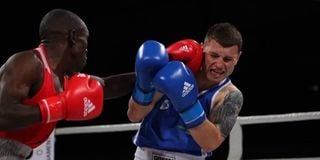Boxing fights for reputation at Tokyo Games after Rio controversies

Kenya’s Nick "Commander" Okoth (left) lands a left hook against Serge Kishko from Ukraine in their featherweight semi-final bout of the Konstantin Kototkov Memorial Boxing Tournament that ended on May 15, 2021 in Khabarovsk, Russia.
What you need to know:
- Boxing first featured at the ancient Olympics and later launched the careers of legends such as Muhammad Ali, Joe Frazier and Floyd Mayweather
- Boxing has been in turmoil in recent years and International Olympic Committee president Thomas Bach warned in 2018 that boxing could be kicked out of Tokyo
- In Tokyo, to ensure more transparency, judges' scoring will be shown after each round instead of just at the end of the fight
Tokyo
Boxing's credibility is on the line at the Tokyo Olympics after a series of scandals saw its governing body given the boot and judging controversies marred the Rio 2016 Games.
Boxing first featured at the ancient Olympics and later launched the careers of legends such as Muhammad Ali, Joe Frazier and Floyd Mayweather, and modern-day champions including Anthony Joshua and Gennady Golovkin.
But in recent years it has been in turmoil and International Olympic Committee president Thomas Bach warned in 2018 that boxing could be kicked out of Tokyo.
The IOC subsequently stripped the AIBA of the right to run the event in the Japanese capital after an investigation into alleged serious mismanagement at boxing's badly tainted governing body. A special task force has taken charge instead.
Judging decisions will be closely watched when the action begins on Saturday in the Japanese capital after the chaos of Rio, which saw 36 officials and referees suspended over allegations of fixing bouts.
"The task force has done as much as possible to protect the integrity of the sport and to ensure the athletes have a fair field of play to compete in," Morinari Watanabe, its chairman, said on Friday.
He hopes that these Games "will be a turning point for the sport".
Boxing scoring has always aroused controversy at the Olympics, and in Rio it burst to the fore once more when judges surprisingly condemned Irish amateur world champion Michael Conlan to defeat to Russia's badly bloodied Vladimir Nikitin.
It was not the only questionable decision in Rio, where the old punch-counting method of scoring bouts was replaced with judges.
In Tokyo, to ensure more transparency, judges' scoring will be shown after each round instead of just at the end of the fight.
David Nyika, a New Zealand heavyweight, said that he now has more confidence in the judging.
"It's one of those things that we should not have to worry about as athletes," he said.
'Toughest tournament in world'
As part of moves to make Olympic boxing more similar to the professional fight game, at Rio pros were allowed to compete for the first time. Only three actually did and they failed to shine.
Perennial powerhouses Uzbekistan and Cuba topped the medals table in the sport, followed by France.
Britain were also up there with three medals, one of them gold, and the country has big expectations to do even better this time.
But Rob McCracken, GB Boxing's performance director, cautioned that the Olympics are the "toughest tournament in the world" and boxing "the toughest sport in the world".
"The whole world's good at boxing now," McCracken, who also trains world heavyweight champion Joshua, told BBC podcast "5 Live Boxing with Costello & Bunce".
"You can go to the world championships (and Olympics) and draw India, and they're phenomenal. You can draw China, and they're phenomenal," added McCracken.
"Now everybody's good, everyone's full time now, everyone takes it deadly serious and the world's really competitive at boxing."
Among the best-known names fighting in Tokyo will be Mary Kom, India's 38-year-old boxing queen who is making a last tilt at Games gold.
Kom is a six-time world champion and won bronze at London 2012, but is desperate to sign off with gold.
In line with most sport at the Tokyo Games, the boxing will be closed to spectators because of measures against the coronavirus, which had already played havoc with Olympic qualifying.
Bouts take place in the heart of the Japanese capital at the Kokugikan Arena, known as the home of sumo wrestling.





